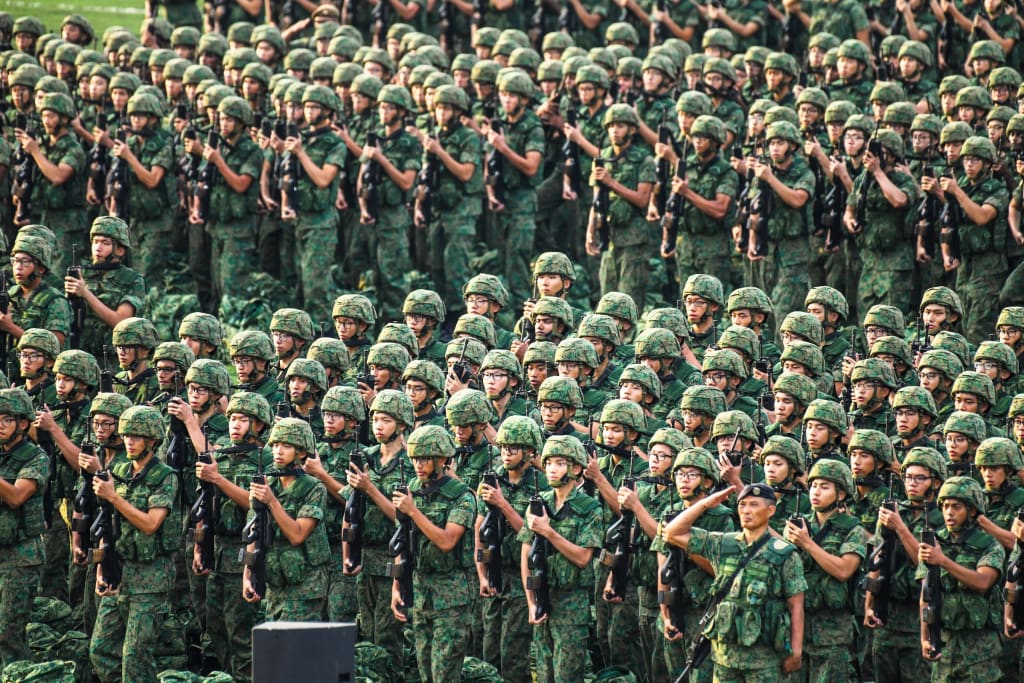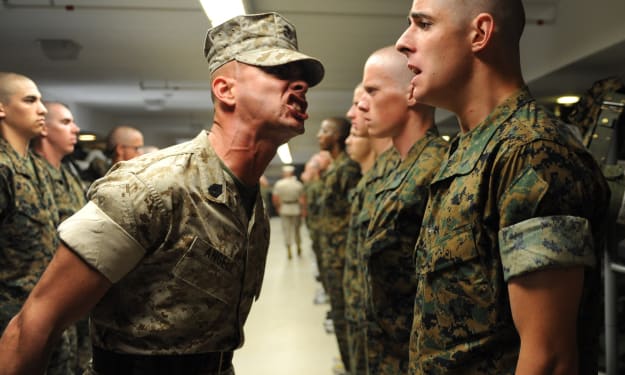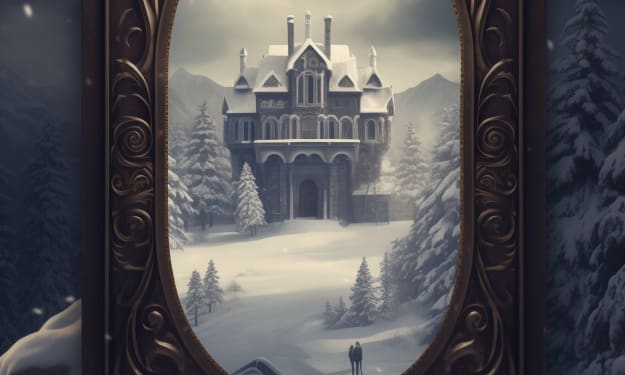
But a new girl would soon enter my life and become my wife, and my wife made me forget it all: forget about talcum-flinging fat boys, forget about Ziggie and his deformed neck, forget about the rich kids with their Bitcoin collections and impossibly hot girlfriends. My wife made me forget not because she was so lovely, but because she was such a high-maintenance woman.
The day I met her was the day the sergeants pulled their biggest trick yet. I smelled a rat when they let us off early. Sergeant Sam was the one to relay the ruse. “Sleep early, boys,” he said during that night’s R.O. “It’s been a long couple of days in camp, you’ve earned it.” We glanced at each other, surprised eyebrows raised below shaved heads. We’ve never had an early night before. I glanced at my watch. The plastic face of my CASIO told me it was only twenty-forty-five. We usually went to bed at least an hour later. Now, an hour off doesn’t sound like much, but in the parallel dimension of camp where we were timed down to the very last second, this set off alarm bells, and rightfully so. Harvind looked at me. He asked, “Cal, what’s up with the early release today?”
“I don’t know bro…but keep your eyes open. Something’s off.”
Something was off alright, because we were attacked in the middle of the night by screaming Japanese soldiers. I was in bed, undressed and dreaming of a beautiful girl whose name may or may not be Helen, and just when things were getting hot and heavy I was shaken out of my wet bliss by an impossible sound.
RAT-AT-AT, RAT-AT-AT, RAT-AT-AT-AT-AT. The shots were loud and angry and oh so unmistakable: it was the sound of gunfire, rending the air like deadly fireworks in the dark. The blare of sirens came a split second later, and the twin sounds melted and mixed with each other to form a maddening symphony that threatened to destroy the peace of the night.
Then many things happened at once. We, the well-trained recruits of Bravo, Platoon Five, Section Four, jumped wide awake, hands reaching up to rub sleep from startled faces. We were a hair too slow, though, because it was at that moment that our bunk door exploded inwards. In streamed soldiers wearing harsh faces and funny-looking uniforms. The uniforms looked funny because they were old: they looked like the stiff-starched trench coats soldiers wore many generations ago. That was not the oddest thing about the uniforms, however. The oddest thing about them were the cheek flaps protruding from their helmets—and with a start, I realized where I had seen that type of uniform before: it was the uniform the Japanese soldiers wore when they successfully invaded and occupied Singapore, more than seven decades ago. These ghosts from the past were fast; in the span of three short seconds, they had us surrounded. They outnumbered us two to one, and all of us were unarmed and still in bed, caught with our pants down, literally.
The sergeants gave the game away when they started speaking in Japanese. “Bakayarou, get out of bed!” It was terrible Japanese, so terrible there was no way the speaker could’ve been Japanese. We obeyed anyway. It’s hard to fight back against uniformed soldiers when you’re dressed in your underwear. “Put on your clothes—and put these on as well!” A thick black zip-tie landed on my bed, and as we hurried to get dressed its purpose was explained to us in bursts of Singlish-accented Japanese. We were to use them to handcuff our hands behind our backs. Something reared in me then, something primal and defensive, and I briefly considered fighting back. I could leap out of bed and kick at the soldiers, my legs free and unhindered by such troublesome things as pants. They wouldn’t be expecting that. I had the element of surprise on my side, Sun Tzu style, and I could reasonably take out three or four of them before I eventually got overwhelmed. What happened next depends on what this operation really was.
Best-case scenario: this is an elaborate prank by the sergeants. Result: I get sent to military jail for assault. I plead self-defense and get a sixty to ninety-day sentence. Worst case scenario: this is for real. The Japanese have somehow invaded again. Result: I get pinned down and clubbed to death by a bunch of pissed-off rifle-wielding soldiers.
I decided to zip-tie my hands together. My bunkmates around me were doing the same. “Tighter, Baka, tie your hands tighter together!” A voice above me said. I peered up at him and saw the familiar chubby cheeks of Sergeant Benny. I asked him in a whisper, “Hey Benny, what’s up with this?”
“Nothing bad bro, don’t worry,” he answered me in a low voice, then yelled out loud to no one in particular. “Urusai! Uru-sai! Stop talking and do what we tell you!” He was trying to be nice but his niceness did not stop an icicle made of fear from sliding down the back of my neck.
When my hands were secured, someone came up behind me and wrapped a piece of cloth around my eyes. My sight was robbed from me then, and I was plunged into a deep and endless night. And judging from the frightened gasps erupting around me, I was not the only one to be blindfolded. Something hard like a rifle butt poked me in the back, and a harsh voice in my ear commanded me to get up and walk.
Down and down I walked, guided by the twin senses of touch and smell. We made our way down the stairs and towards the parade square where the war-sounds of sirens and gunshots were loudest. From the sound of it, the entire Bravo Company was gathered there, hundreds strong, and there we were forced to crawl on our hands and knees on the sharp gravel of the ground. As we crawled there were what sounded like bullets whizzing through the air, and all the while the mad siren kept on screaming and screaming. It was impossible, impossible; there was no chance at all, but we were poor men brave against the odds. We didn’t beg or cry out. We just crawled on grimly, painfully, exposed skin getting sliced to ribbons as we crawled on our bellies for what seemed like hours, blind, bound, and deafened by the ruckus, by the impossibility of it all.
Then my fingers came to rest on something. It felt like a wheel, the wheel of a large truck. Rough fingers seized my hands and untied me, and once we were all untied we were told to embark and take off our blindfolds. We clambered up clumsily with tingling hands numb with constriction. We took off our blindfolds. It was not yet dawn, but I could see the faces of the recruits around me by the light of the silver moon.
Harvind and I shared a look, and when he said to me in a deadpan manner, “You’re right, bro, something was off,” I couldn’t help but laugh.
We were left alone in the darkness with each other and our thoughts. Was life always going to be like this? Were the next two years going to consist of rough shakes awake and a rifle to our backs forcing us to crawl on our bellies like snakes? Was the fear of God and Death going to be put into our hearts constantly and for no good reason at all? That was no way for a man to live…
It was a welcome respite when the tonner roared to life. We didn’t know where we were going, but we were getting out of here, and that was good enough. It was early, very early, but Singapore is a city that never sleeps, and as we drove we passed some cars on the road. I squinted so I could better see the faces in the cars, and they all looked so comfortable, so content, so blissfully unaware of the madness that was going on just a few feet away from them. I wanted to reach out to them. I wanted to cry out: “Hey! Hey, you there! Do you know what they’re doing to us, do you have any idea what lengths we soldiers go through to keep this little red dot safe, to keep your bodies free of bullet holes and the road beneath your wheels free from bombshells?” But there was no point yelling. They could not hear me―and even if they did, they would not care.
The longer we drove, the clearer the air got, and soon the morning air smelled of the unmistakable tang of the sea. The smell filled my nose with salt and my heart with longing. The ocean always reminded me of freedom, and I knew deep in my heart that we were headed to the place where the sand met the sky and the sea. We were headed to the beach.
I was right. We disembarked at Changi Beach, and there, we were greeted by a surprising sight. There, right on the edge of the waves, were our officers. The reason why I haven’t mentioned them until this point is simple—we didn’t get to interact with them much. Part of it was no doubt a ploy to make the officers appear unreachable and therefore seem that much higher and brighter than us. As ploys go, it was a smart one. Machiavelli would approve. However, I had a feeling that the more important reason for their absence was that they wanted to wait for a suitable moment to unveil themselves. Whatever this occasion was, it was important.
Yes, there was a whole host of officers formed up neatly in the sand. The bars on their chest shone with a smug superiority and the Singaporean flag mounted on a stick behind them seemed to lend them an air of casual regalness. Dawn was breaking, and the grey-gold light of the morning illuminated the groundsheets in the sand. On those groundsheets were guns. Many, many guns. We formed up facing the guns and the officers. The entire camp was there; young boys not yet men woken up in the middle of the night to be gathered here, all equally frightened and confused but all standing straight-backed in the sand, too proud to show our fear.
Then Captain Zheng, Bravo’s Commanding Officer, started to speak. “Good morning, gentleman. You must be wondering what is going on, and why we brought you here in the manner we did. Believe it or not, there is a reason for your Turn-Out this morning.” There was a meaningful pause. The waves sloshed. The red-white flag billowed. Zool scratched his nose.
Zheng continued, “This beach, gentleman, was where the Sook Ching happened.” Zheng had a somber look on his face. His voice was somber too, somber and sober and lightly tinted with a hint of colonial English. He was very tall and had an air of benign conceit bred into him. His entire being dripped with an up-per-crust upbringing and an expensive education overseas. I could hear him say it already, “Yes, yes, the kids from Raffles may be smart, they can run Singapore—but we are the ones who own it.”
Zheng continued. “The Sook Ching was a purge the Japanese soldiers carried out against innocent Chinese civilians in retaliation against the fierce resistance they encountered in China. Here—RIGHT ON THIS SPOT, thousands of young men—men just like you—were rounded up in the wee hours of the morning. They were handcuffed. They were blindfolded. Then they were brought here...and executed.”
I got to hand it to this Zheng fellow. He may be an overeducated elite, but he was good. He really had the whole offended warrior thing going. Part of it stemmed from the fact that he seemed to really believe in what he was saying, but most of his magic has got to do with his delivery. The variance of his pitch and the lyrical ups and downs of his tone were like soundwaves in our minds, and we listened in rapt attention as he described in tones of furious passion the numerous atrocities that were committed against Our People. When Zheng felt the first stirring of our hearts, he pivoted and played the empathy card.
“I know that, for these past few weeks, you have experienced a lot of hardship, hardship you are not used to in your former life—hardship beyond comprehension. But know that this suffering is not for nothing. You’re suffering so that what happened here, WILL NOT HAPPEN AGAIN.” Another well-timed pause, and this time Zheng takes the time to look at each of us in the eye, scanning our faces with an appraising look. He continued, “You’re here so we can help you understand. Us dragging you out of your beds, us handcuffing you, blindfolding you, all this is not for fun. It’s what our forefathers went through one terrifying night seventy years ago—before a bullet was put into their brains and their bodies were buried in mass graves—buried right where you’re standing.” And with this, Zheng pointed a stiff, commanding finger on the ground and said, “Here, right here where the white sand was stained red with our forefather’s blood, we’re going to hand you your guns. These guns are not just any ordinary weapons. They are the SAR-21 rifles, rifles made specially in Singapore—made specially to defend Singapore—and you’re going to use them for their intended purpose. You’re going to use these guns to defend our country. YOU are all that stands between us and atrocities like this. And YOU are going to make sure that something like this…never, EVER, happens again. Is that understood?”
“Yes, sir!” We roared with one voice. Startled sparrows shot in the sky, and I noticed with surprise that my stomach, too, seemed to have grown wings. A few wet tears sprang unheralded to my eyes. I wiped them away before anyone could see them. Why was I getting emotional? I thought to myself angrily. Was I a simpleton like the rest? Is a tall man in a smart uniform saying a few sweet words all it takes to brainwash me?
No sir, not me, not Calvin Yang. I promised my Dad, I promised my coaches: I promised them that I would fight, that I will not be affected by the old loyalty-to-country bullshit, the same old tired story the elites have been feeding the people for centuries to get them all hot under the collar and ready to fight, yes, ready to fight and die and protect the country, but more importantly the banks and the land and the businesses that the elites own. I know the game, I have long seen through it, so why am I feeling this way? Why does my heart not feel like a piece of pumping meat in my chest but a fluttering bluebird in my throat, alive and singing with foolhardy notions of glory?
Then, before I could process my thoughts, our names were called out one by one. We were going forward to receive our rifles. Captain Zheng presented the guns to each recruit personally. Before receiving it, we were to grasp it with both hands and yell, “Thank you, sir. I will defend Singapore…WITH MY LIFE.” When it was my turn, I stepped forward fast, meaning to grab the gun quick, blurt out the words, and go. And I would have done it too, if Captain Zheng didn’t catch me off-guard by giving me a smile.
“Recruit Yang…you’re the fighter, right?” he said.
I was stunned. I could only nod and say, “Yes, sir.”
“I’ve seen your test scores,” Zheng said. “I know that you’re fit. I know that you’re capable. And as capable as you are on the track, I know that you’re going to prove equally capable in the field with your rifle.” A pause. “I’m going to hand her over to you now. I expect you to look after her carefully and with respect. I expect you to treat her the same way you would treat your wife. Is that understood?”
“Yes, sir.”
He stuck the gun out at me, and all I could do at that moment was grab it like dozens of my brothers have done before me. I said the words, and I really meant it. “Thank you, sir. I will defend Singapore…WITH MY LIFE!”
When the last name was called and the last rifle was given out we formed up close again, and there we stood, facing each other, Recruit and Officer, Commander and Men. It dawned upon me then that despite our differences, we were all of us Men of the Lion City. We were all descended from the same forefathers who had so hopefully crossed the Straits, and who were so sadly slain on a stretch of lonely sand so long ago. When they played the national anthem, we stood tall and proud with our rifles in our left hands and our right fists on our hearts, and when the last trills of Majulah Singapura faded away a cold wind blew from the sea and set the moon-and-stars of our young flag aflutter like the proud pennant of some unconquered kingdom. Dawn broke, and the world was alive with birdsong and the golden glow of the morning.
I felt it then, I really did. I bought it all: hook, line, and sinker. At that moment, with the echoes of our national anthem ringing in my ears and my rifle-wife cradled in my arms, I felt it strike me deep in my cynical, Singaporean heart.
I loved Big Brother.
-
The above story is an excerpt taken from my memoir, National Service: Confessions of a Skiving Soldier.






Comments
There are no comments for this story
Be the first to respond and start the conversation.